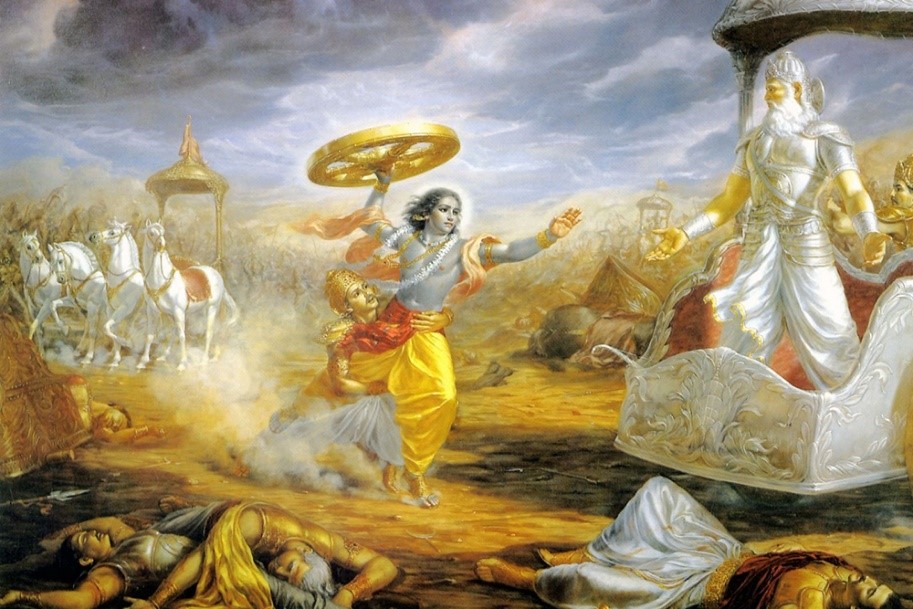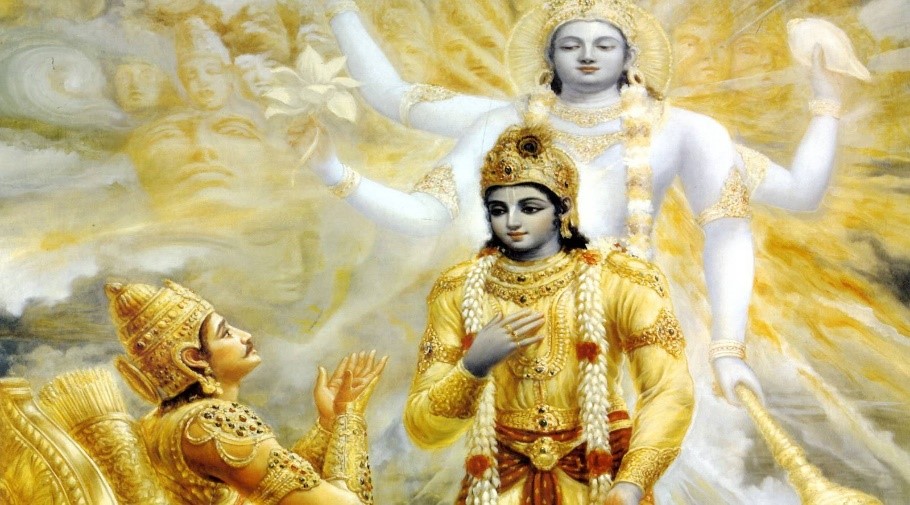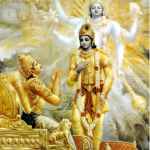Hare Krishna!
In the great epic Mahabharata, when the fierce battle of Kurukshetra was about to begin, Lord Krishna — the Supreme Personality of Godhead — chose to deliver the timeless wisdom of the Bhagavad Gita not to the eldest and most dharmic brother, Yudhishthira, but to Arjuna, the warrior prince standing on the battlefield, trembling with doubt and compassion.
Many devotees and readers have wondered: Why did Krishna choose Arjuna and not Yudhishthira, who was known for his righteousness, wisdom, and adherence to dharma?
Let us understand this through the lens of scripture and the teachings of His Divine Grace A.C. Bhaktivedanta Swami Srila Prabhupada.
1. Arjuna’s Inner Conflict: A Perfect Setting for the Gita
When Arjuna stood on his chariot in the middle of the battlefield, he was overwhelmed by compassion and confusion. He saw his teachers, relatives, and friends arrayed against him, and his heart melted.
He said:
“dṛṣṭvemaṁ svajanaḿ kṛṣṇa yuyutsuḿ samupasthitam”
(Bhagavad Gita 1.28)
“My dear Krishna, seeing my friends and relatives present before me in such a fighting spirit, I feel the limbs of my body quivering and my mouth drying up.”
Arjuna’s emotional breakdown was not a sign of weakness but the sign of a soft heart — a heart that Krishna could mold. Srila Prabhupada explains that Krishna selected Arjuna because he was not proud of his knowledge or position; he was humble and submissive enough to receive divine instruction.
Krishna wanted to demonstrate how a sincere seeker should approach the Supreme Teacher — with humility, surrender, and inquiry.
2. Yudhishthira Was Already a Knower of Dharma
Yudhishthira Maharaja, known as Dharmaraja, was already a perfectly righteous man. His actions were always guided by moral principles and dharma. He was steady, self-controlled, and already following the path of righteousness.
The Bhagavad Gita, however, was not primarily a discourse on morality or ritualistic dharma — it was a revelation of the highest spiritual truth:
surrender unto Krishna (sarva-dharmān parityajya).
Krishna wanted to speak this confidential knowledge — “Raja Vidya, Raja Guhyam” (the King of knowledge and the most secret of all secrets, BG 9.2) — to someone who needed practical guidance to overcome illusion.
Arjuna’s confusion — between his worldly duty and his spiritual responsibility — represented the human condition itself. Therefore, Krishna chose Arjuna so that the Gita could serve as a universal guide for all of us struggling souls.

3. Arjuna’s Relationship with Krishna: Deep Friendship and Surrender
In Bhagavad Gita 4.3, Lord Krishna Himself declares:
“sa evāyaṁ mayā te ’dya yogaḥ proktaḥ purātanaḥ
bhakto ’si me sakhā ceti rahasyaḿ hy etad uttamam”
“That very ancient science of the relationship with the Supreme is today told by Me to you because you are My devotee as well as My friend; therefore you can understand this transcendental mystery.”
Here Krishna clearly states why Arjuna was chosen — because he was both a devotee (bhakta) and a friend (sakhā).
Srila Prabhupada elaborates:
“A person can understand the science of Krishna only when he has a relationship of love and devotion. Arjuna was qualified in both ways; therefore, he could receive the confidential knowledge of the Gita.”
(Bhagavad Gita As It Is, Purport to 4.3)
Krishna did not speak this sacred knowledge to learned scholars or austere sages — He spoke it to His pure devotee, a person who was humble, loving, and ready to serve.
4. The Perfect Disciple — Not Proud, But Sincere
Arjuna did not pretend to be wise. In fact, he admitted his confusion openly and sought guidance. He said:
“kārpaṇya-doṣopahata-svabhāvaḥ pṛcchāmi tvāḿ dharma-sammūḍha-cetāḥ”
(Bhagavad Gita 2.7)
“Now I am confused about my duty and have lost all composure because of weakness. In this condition, I am asking You to tell me for certain what is best for me.”
Then, surrendering fully, he added:
“śiṣyas te ’haḿ śādhi māḿ tvāḿ prapannam”
“Now I am Your disciple, and a soul surrendered unto You. Please instruct me.”
This is the turning point. Arjuna’s humility and surrender made him the perfect recipient of Krishna’s instruction.
As Srila Prabhupada says:
“The Lord is very pleased with His devotee when the devotee asks Him questions and puts himself as His eternal servant.”

5. The Lesson for All of Us
The Gita was spoken not for Arjuna alone but for all humanity. Yet Krishna chose Arjuna as His representative because Arjuna’s situation — doubt, duty, confusion, and eventual surrender — is universal.
We all face our own Kurukshetras in life — moments where material duties clash with spiritual wisdom. In such times, we too must become like Arjuna: honest in our confusion, humble in our inquiry, and sincere in our surrender.
As Srila Prabhupada beautifully concludes:
“One who follows in the footsteps of Arjuna can also understand the Bhagavad Gita. The Gita is not for armchair speculators but for those ready to act in Krishna consciousness.”
Conclusion
Krishna chose Arjuna not because he was the most learned or the most righteous — but because he was the most sincere.
His heart was open. His pride was absent. His surrender was complete.
And in that surrender, the Lord revealed the eternal wisdom of the Bhagavad Gita — a treasure that continues to enlighten the world even today.
Let us, too, approach the Lord with the same humility as Arjuna and pray for guidance on our spiritual path.
Hare Krishna!
Courses links
Follow the Learn Gita Live Gita channel on WhatsApp




